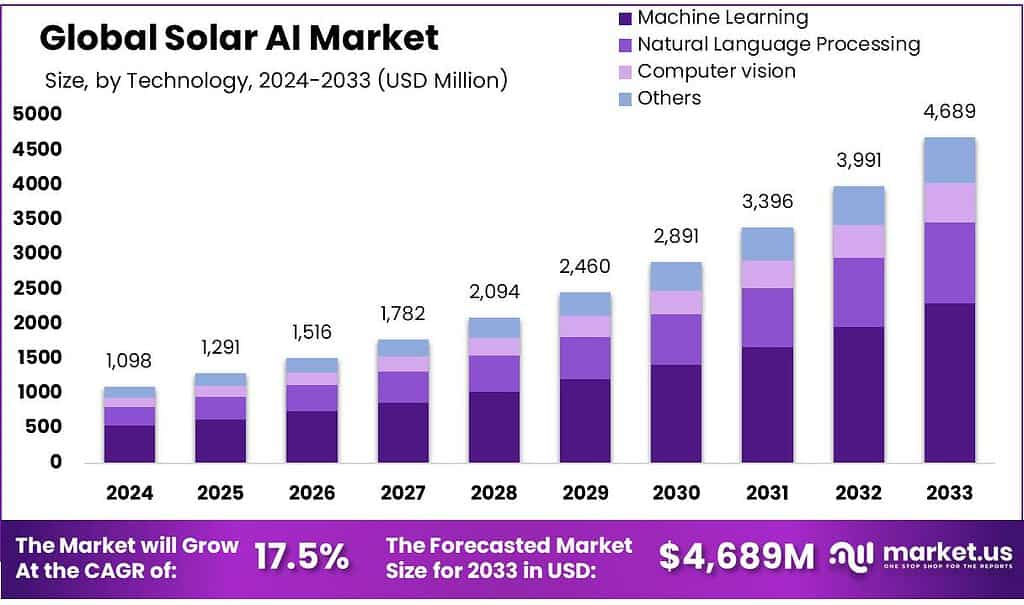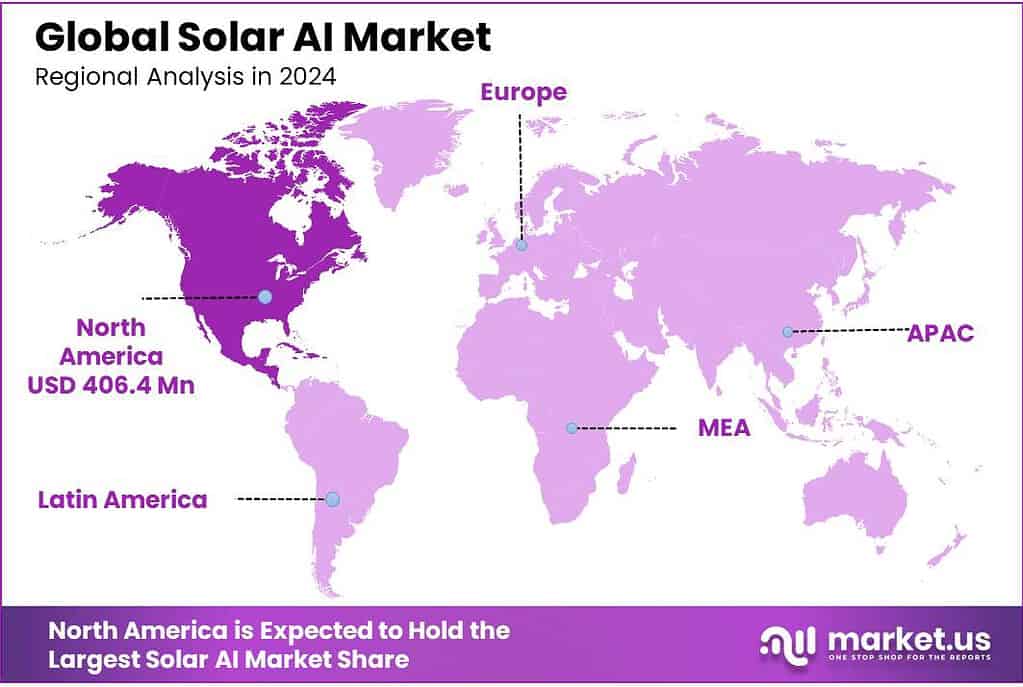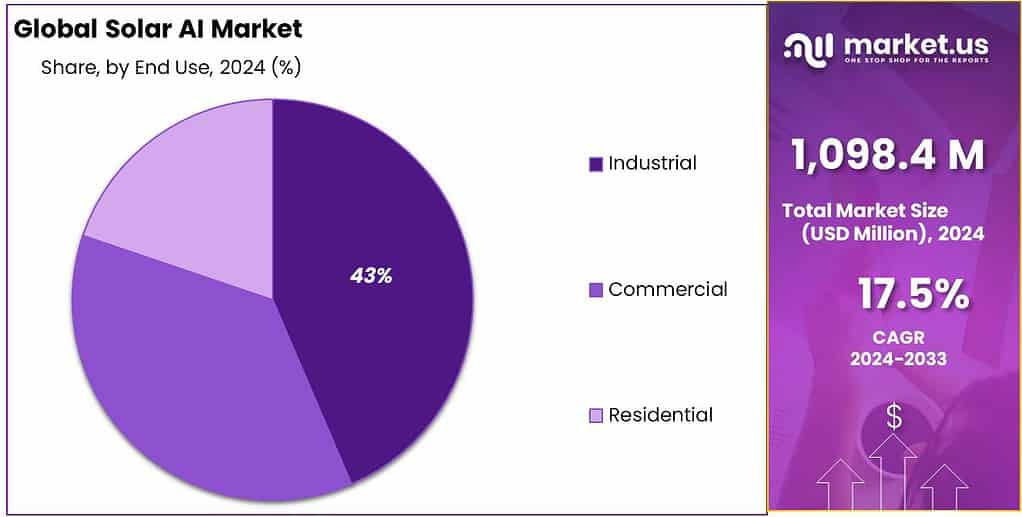Global Solar AI Market By Technology(Natural Language Processing, Machine Learning, Computer vision, Others), By Application(Energy management, Smart grids, Energy production, Smart meters, Demand forecasting, Others), By End-Use(Residential, Commercial, Industrial) , By Region and Companies - Industry Segment Outlook, Market Assessment, Competition Scenario, Trends and Forecast 2024-2033
- Published date: May 2025
- Report ID: 131567
- Number of Pages: 373
- Format:
-
keyboard_arrow_up
Quick Navigation
Report Overview
The global Solar AI Market size is expected to be worth around USD 4,689 Million by 2033, from USD 1,098 Million in 2023, growing at a CAGR of 17.5% during the forecast period from 2025 to 2033. In 2024, North America holds a leading 37.6% market share, valued at USD 406.4 million.
Solar Artificial Intelligence (Solar AI) refers to the integration of artificial intelligence technologies into solar energy systems to enhance their efficiency, reliability, and overall performance. By leveraging machine learning algorithms, predictive analytics, and real-time data processing, Solar AI enables the optimization of energy production, forecasting of solar irradiance, and proactive maintenance of solar infrastructure.
Key drivers propelling the Solar AI market include the integration of AI-driven solutions in solar energy systems, advancements in AI technologies, and the increasing emphasis on renewable energy sources. These factors contribute to the development of innovative energy generation models and the enhancement of energy management practices.
Governments worldwide are actively promoting the integration of artificial intelligence in the solar sector through strategic policies and investments. For example, the German government has set ambitious targets to reach 215 GW of solar power capacity by 2030, a policy expected to significantly drive the growth of the solar AI market.

The U.S. Department of Energy (DOE) has allocated a substantial USD 130 million to advance solar power technologies, focusing on cost reduction, manufacturing strength, and grid resilience. This funding, directed toward early-stage research, reflects a strategic move to reinforce energy independence and lead in clean energy innovation.
In parallel, Japan is planning to raise the share of renewable energy in its electricity mix from nearly 20% to 36-38% by 2030. This target, nearly doubling current levels, aligns with its national commitment to reach net-zero emissions by 2050, positioning the country as a serious contender in the global clean energy transition.
The demand for Solar AI technologies is escalating due to their ability to optimize energy production, improve grid integration, and enhance the reliability of solar power systems. By enabling precise forecasting and efficient energy distribution, Solar AI supports the stability and resilience of power grids, thereby meeting the growing energy needs of various sectors.
For instance, In February 2025, Sunnova Energy International, Inc. partnered with OpenSolar to embed AI-powered design into its Catalyst dealer platform. This collaboration enhances the speed and accuracy of solar system proposals across the U.S., helping dealers respond to rising demand while improving deployment efficiency and setting a new industry benchmark for precision.
The solar AI market is experiencing rapid advancements thanks to innovations aimed at boosting the efficiency of solar energy systems. In 2023, machine learning technologies captured a substantial portion of the market, approximately 42.35% of the revenue share, underscoring their importance in optimizing the performance and data analysis of solar installations.
Key Takeaways
- Solar AI Market size is expected to be worth around USD 4689 Million by 2033, from USD 1098 Million in 2023, growing at a CAGR of 17.5%.
- Machine Learning held a dominant market position, capturing more than a 49.2% share in the Solar AI market.
- Energy Management held a dominant market position, capturing more than a 34.5% share in the Solar AI market.
- Industrial sector held a dominant market position, capturing more than a 44.3% share in the Solar AI market.
- North America stands as a dominant player, commanding a significant 37.6% market share with a valuation of USD 406.4 million.
North America Market Size
The Solar AI market exhibits diverse dynamics across global regions, reflecting varying degrees of technology adoption and market maturity. North America stands as a dominant player, commanding a significant 37.6% market share with a valuation of USD 406.4 million. This dominance is largely due to advanced technological infrastructure and substantial investments in AI integration for optimizing solar energy production and grid management.

By Technology
Dominance of Machine Learning in the Solar AI Market 49.2% Share
In 2024, the Machine Learning (ML) segment held a dominant position in the Solar AI market, capturing more than a 49.2% share. This dominance can be attributed to ML’s superior capability to process vast datasets, enabling enhanced predictive maintenance, real-time decision-making, and optimization of solar panel operations.
By analyzing historical weather patterns and system performance data, ML algorithms can forecast energy production with greater accuracy, thereby reducing downtime and operational costs. The integration of ML in solar energy systems has significantly improved forecasting accuracy.
Studies have shown that ML algorithms can reduce forecasting errors by up to 25% compared to traditional methods. This enhanced accuracy not only facilitates better grid integration of renewable sources but also enables more efficient planning and resource optimization. Consequently, ML’s application in solar energy contributes to increased reliability and efficiency of power supply.
Furthermore, ML’s role extends to energy trading by providing accurate predictions of energy generation and market prices. This capability allows energy traders to make informed decisions, optimizing margins and minimizing risks in the volatile energy market. By leveraging ML, stakeholders can enhance the economic value of solar installations, ensuring better returns on investment.
By Application
Dominance of Energy Management in the Solar AI Market 34.5% Share
In 2024, Energy Management held a dominant market position, capturing more than a 34.5% share in the Solar AI market. This segment benefits significantly from AI-driven solutions that optimize energy storage and consumption, enhancing both cost efficiency and energy distribution in solar operations.
The prominence of Energy Management in the Solar AI market is driven by the integration of AI technologies that enable real-time monitoring and predictive analytics. These capabilities allow for more accurate forecasting of energy demand and supply, facilitating better decision-making in energy distribution and consumption.
By leveraging AI, solar energy systems can dynamically adjust to changing conditions, ensuring optimal performance and efficiency. Furthermore, AI-enhanced energy management systems contribute to the reduction of operational costs and improvement of energy efficiency.
For instance, AI algorithms can identify patterns in energy usage, detect anomalies, and suggest corrective actions, leading to more efficient energy utilization and reduced waste. This not only benefits the operational aspects of solar energy providers but also aligns with global sustainability goals by minimizing the carbon footprint.
The integration of AI in energy management also supports the development of smart grids and demand response strategies. By predicting energy consumption patterns, AI enables the implementation of demand-side management programs, which balance energy supply and demand more effectively.
By End-Use
Dominance of the Industrial Sector in the Solar AI Market 44.3% Share

-
-
- Smart Helio
- Solavio
- Tespack
- Suncast
- Scopito
- Sunai
- ENFOR
- Infra Solar
- Loggma
- Solar Captus
- Solar Inspectron AI
- Glint Solar
- Absolar
- Climatik













